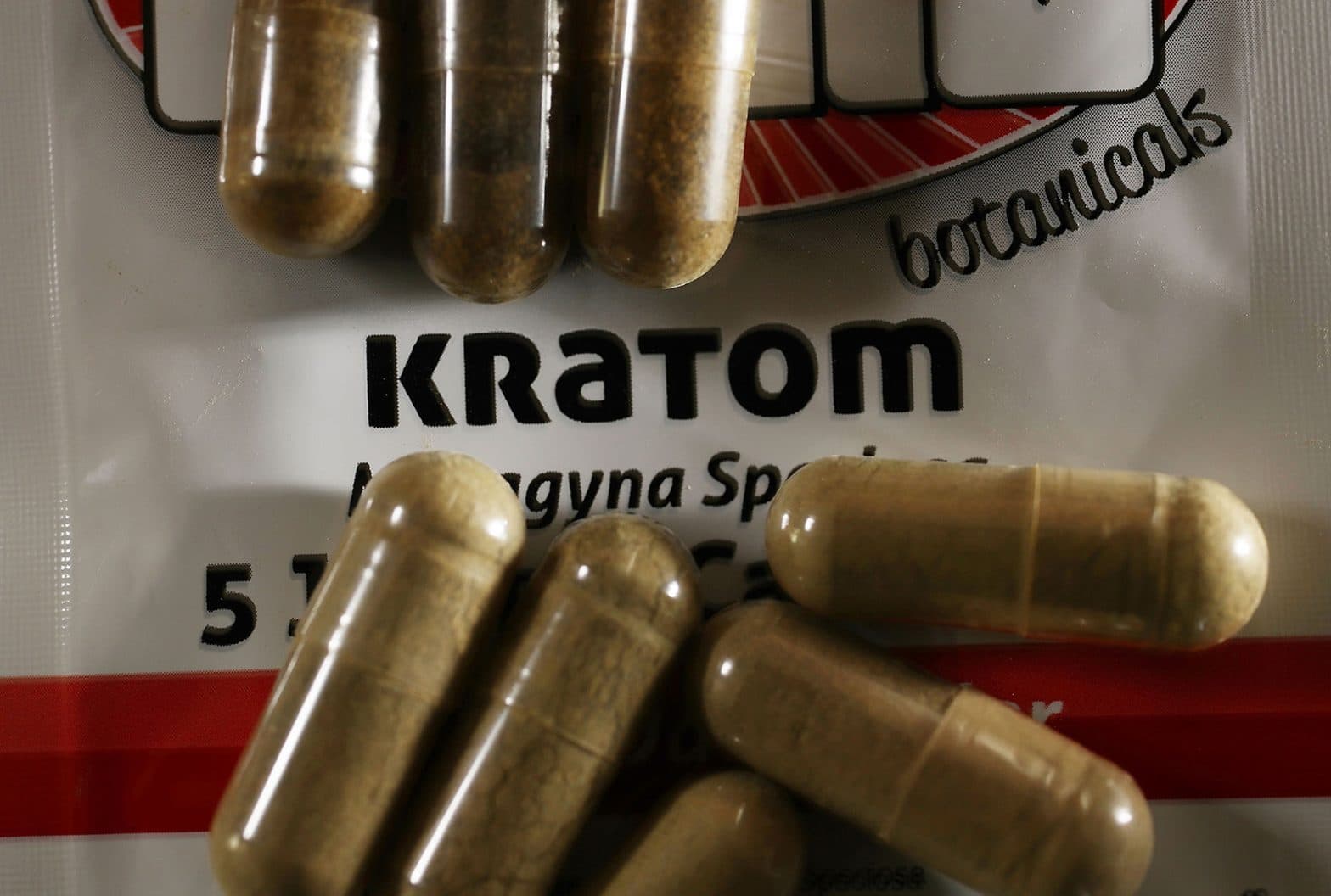‘Magical Leaf’ or ‘Imminent Hazard’? Users Love Kratom, But Feds Might Ban It

KANSAS CITY, Mo. — The first time she used kratom, Ashley McCaughan was scared.
Someone had suggested she try the controversial herbal supplement to fend off the aches and pains of her job managing a personal watercraft company in Florida. Shoving those heavy machines from the dock all day left her tired all the time.
But with the first drink, she “noticed a positive effect on not only pain relief, but my mood,” said McCaughan, who is 27 and now lives in Blue Springs. “I was like a better version of myself.”
As the country tries to stop a deadly epidemic of opioid abuse, more Americans — an estimated 15 million now — are turning to kratom to ease pain, quell anxiety and lift themselves out of depression.
But federal health officials want to ban it, warning that kratom, like opioids, can be addictive and lead to abuse. Three kratom-related deaths in the St. Louis area last year led local governments in the region to consider prohibiting the product.
Now one of its most vocal proponents is fighting to get states to pass strict regulations for kratom products instead of banning them outright.
The Virginia-based American Kratom Association is taking its case from statehouse to statehouse — including Kansas’ and Missouri’s. It wants states to adopt its Kratom Consumer Protection Act, which would regulate the preparation, distribution and sale of kratom products.
The group’s lobbyists met with Kansas legislators last year, and this month pitched the regulations in Jefferson City. Kratom is legal to use in Kansas and Missouri.
Four states — Utah, Georgia, Arizona and Nevada — have adopted versions of the proposal that would also ban the sale of adulterated kratom products, blamed for recent deaths, said C. McClain Haddow, the group’s senior fellow on public policy.
“Today, we have 21 states that are considering it. Missouri is one of them,” Haddow said. “We’re seeing real progress going forward. “We’re encouraged by the response from the state legislators. We wish the FDA would align itself with the right public policy.”
———
You can buy kratom and kratom products on the internet and in mom-and-pop vitamin and health food stores, vape shops, head shops and convenience stores. Still, many people have never heard of it, much less know how to pronounce it.
Some people say “KRAY-tum,” some say “KRA-tm.”
And they certainly don’t know this: “It tastes like dirt,” McCaughan said.
“At first glance, kratom doesn’t seem like anything special: a light green plant with red veins, about two meters tall,” Vice, a culture and news website, wrote in July.
Its botanical name is Mitragyna speciosa, a member of the coffee family that is native to Southeast Asia, “with leaves that contain compounds that can have psychotropic (mind-altering) effects,” according to the National Institute on Drug Abuse.
“Kratom is not currently an illegal substance and has been easy to order on the internet. It is sometimes sold as a green powder in packets labeled ‘not for human consumption.’ It is also sometimes sold as an extract or gum.”
Most people, users say, take kratom in a pill or capsule, or brew it to make tea. Hardcore users mix the powder into water, but McCaughan said it doesn’t dissolve, just floats on the top like cinnamon would.
“There are no historical records indicating when humans began consuming kratom, but the plant’s benefits have been widely known for ages,” wrote Vice, calling kratom “a magical leaf of sorts, having a calming and painkilling effect.
“The only downside? It’s extremely bitter.”
“That’s why a lot of people take it in the pill form,” McCaughan said.
In Florida, “kratom is absolutely huge,” she said. “They have kratom bars. You walk in and they have different flavors. … They flavor it with different syrups. It’s almost like a hipster tea bar.”
She didn’t feel comfortable taking kratom pills because both of her parents battled addiction. So she brews kratom tea, but it’s no ordinary cup of tea. The brew relieves her physical pains and helps relax her without making her feel depressed, she said.
“There’s a little bit of science to it,” she said “To really bring out the ‘euphoric effects,’ to actually feel something, it has to basically sit out and go to room temperature after you brew.
“Then you basically put it in the fridge for 24 hours, put lemons and stuff in it to make it taste better, because a lot of people won’t get into kratom because of the flavor.
“It’s a really interesting taste, and most people will try it for the first time and go ‘Oh my gosh, no, never again.’”
Kratom’s nasty flavor comes up often in online conversations. In a recent back-and-forth between users on Reddit, one person wrote that “I think it’s an acquired taste, like spicy food or scotch. Not many people like it the first time, but it gets better.”
Another said that adding Crystal Light helps mask the nasty. Others suggested adding Gatorade, squirts of honey and chocolate milk. “I find the taste pretty abhorrent and I had just been toughing it out,” the Crystal Light user wrote. “I was really surprised at how easily the taste was covered up.”
Dexter Blackmer of Smithville is one of those folks who takes his kratom straight up, with no sweet enhancement like Crystal Light.
On April 2, 2017, Blackmer and a friend were cruising down Wornall Road on their motorcycles when a car pulled out in front of them. Blackmer swerved, hit the curb and during the violent clash of skin and pavement, a street sign cut off his foot.
During the 44 days he spent in the hospital, half that leg was amputated.
A few months after the crash, Blackmer, who is 40, and his wife, Andrea, watched a Netflix documentary about kratom, “Leaf of Faith,” that explores its use as a natural alternative to opioid painkillers.
Andrea started Googling. “Wow, this would be great for you,” she told her husband.
They had been looking for an alternative to the nerve blocker his doctors had prescribed, a medication that interfered with his sense of touch, a side effect that got in the way of his job repairing semis at their company, Elite Truck Repair.
The kratom, which he took for more than a year, relieved his phantom leg pains with no side affects, the couple said. He stopped taking it a few months ago so it wouldn’t interfere with a new medication.
“I tell everyone about it,” said Andrea. “It did great things for him.”
She started taking it, too, for arthritis pain in her ankle. It made her feel “better,” but she “just couldn’t get past the taste of it. It tastes like eating grass.”
———
People with fibromyalgia, back pain, PTSD, arthritis, carpal tunnel syndrome, debilitating headaches and depression use kratom as a substitute for prescription drugs. But is it safe?
The Food and Drug Administration has repeatedly warned that kratom offers no medical benefits but could become addictive or even kill you. It says that people who are using it to self-treat pain, anxiety, depression and other medical conditions should instead be seen by licensed health care providers.
An FDA spokesman directed the Kansas City Star to an official statement on its website: “There are no FDA-approved uses for kratom, and the agency has received concerning reports about the safety of kratom.
“We continue to evaluate the available safety information about the effects of kratom and continue to work with the Department of Justice to enforce regulations that pertain to kratom.
“Selling unapproved kratom products with claims that they can treat opioid withdrawal and addiction and other serious medical conditions is a violation of federal law.”
In 2016, the DEA announced plans to use its emergency authority to add kratom to its Schedule I list, which would effectively ban it. The DEA deemed kratom an “imminent hazard to public safety.”
The American Kratom Association mobilized its then-8,000 members, who protested and flooded the DEA’s website with their opposition. The agency withdrew its plan and ordered the FDA to research kratom more.
In 2017, “the FDA identified at least 44 deaths related to kratom, with at least one case investigated as possible use of pure kratom,” the National Institute of Drug Abuse says on its website, noting that “most have involved other substances.”
Many of the kratom-associated deaths “appeared to have resulted from adulterated products or taking kratom with other potent substances, including illicit drugs, opioids, benzodiazepines, alcohol, gabapentin, and over-the-counter medications, such as cough syrup,” the drug abuse agency noted.
A medical expert hired by the American Kratom Association to examine those deaths found that “every one, with the exception of one — for which there was no blood sample available, so no one knows — were adulterated kratom products where you had fentanyl, morphine, heroin, spiked into the kratom,” Haddow said.
“It’s not surprising there would be kratom detected in an autopsy if that patient were in the process of using kratom to try to wean off of or reduce their opioid use. So the question is, what really killed the person?”
The FDA says it is “actively evaluating available scientific information” about kratom and “continues to warn consumers” not to use products that contain it.
Six states banned kratom between 2012 and 2016, Haddow said. Between 2016 and 2018, 14 states considered banning it, and his group successfully lobbied against those proposals.
“But we realized this is a fool’s errand because we keep playing whack-a-mole,” Haddow said. “So we developed this concept of the Kratom Consumer Protection Act.”
While the FDA tells people that kratom is bad and should be avoided, “in fact the right policy ought to be harm reduction,” Haddow said.
The act asks states to register all kratom products and require that they not be adulterated with any substance that could harm consumers.
“So they have to sell the pure kratom product,” said Haddow. “And it cannot be spiked with anything, and it has to be labeled with all ingredients, and include a specific identification of the manufacturer so if there is an adverse event that happens it can be tracked back and we can check the status of that product and whether it was formulated and manufactured properly.”
Another requirement: Independent, third-party certification of what the contents are.
And, Haddow’s group wants states to set age limits for kratom use, either 18 or 21.
“We favor 21 because it conforms with the feds on tobacco policy,” Haddow said. “Not because there is any documented use of kratom by children, there isn’t because it tastes so bad. And they wouldn’t take it because it doesn’t give you a high unless it’s adulterated.
“But we think that it’s a good policy to let parents consult with any child who is trying to manage their pain to be part of that process.”
With good labeling, and restrictions to ensure that the product is pure, “then I think that the consumer is protected,” Haddow said.
———
©2020 The Kansas City Star (Kansas City, Mo.)
Visit The Kansas City Star (Kansas City, Mo.) at www.kansascity.com
Distributed by Tribune Content Agency, LLC.























